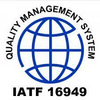
IATF16949
About (IATF16949)
IATF 16949 is an international quality management standard specifically designed for the automotive industry. It is based on the ISO 9001 quality management system requirements and includes additional industry-specific requirements.
IATF 16949 sets out the criteria for a quality management system that aims to enhance customer satisfaction and ensure the consistent delivery of high-quality automotive products and services. It covers various aspects of the automotive supply chain, including the design, development, production, and service of automotive-related products.
The standard focuses on key areas such as:
Customer-specific requirements: It emphasizes meeting the specific quality requirements of automotive manufacturers and addressing customer expectations.
Product safety: It emphasizes the need for robust processes and controls to ensure the safety and reliability of automotive products.
Continuous improvement: It promotes a culture of continuous improvement through the use of quality tools and techniques, such as lean manufacturing and Six Sigma.
Risk management: It requires organizations to identify and mitigate risks in their processes and supply chain to ensure the consistent delivery of high-quality products.
Supplier management: It emphasizes the importance of effective supplier management to ensure that suppliers meet the required quality standards and contribute to the overall quality of the automotive product.
IATF 16949 certification is highly regarded in the automotive industry and is often a prerequisite for becoming a supplier to major automotive manufacturers. Achieving certification demonstrates an organization's commitment to quality and customer satisfaction and helps build trust and credibility with customers.
Certification to IATF 16949 is typically conducted by third-party certification bodies that assess an organization's compliance with the standard's requirements through on-site audits and evaluations. Organizations need to demonstrate effective implementation of the quality management system and meet the specific automotive industry requirements to achieve and maintain certification.